Baby David's Giant Battle: Massillon toddler is doing 'phenomenal' after kidney transplant
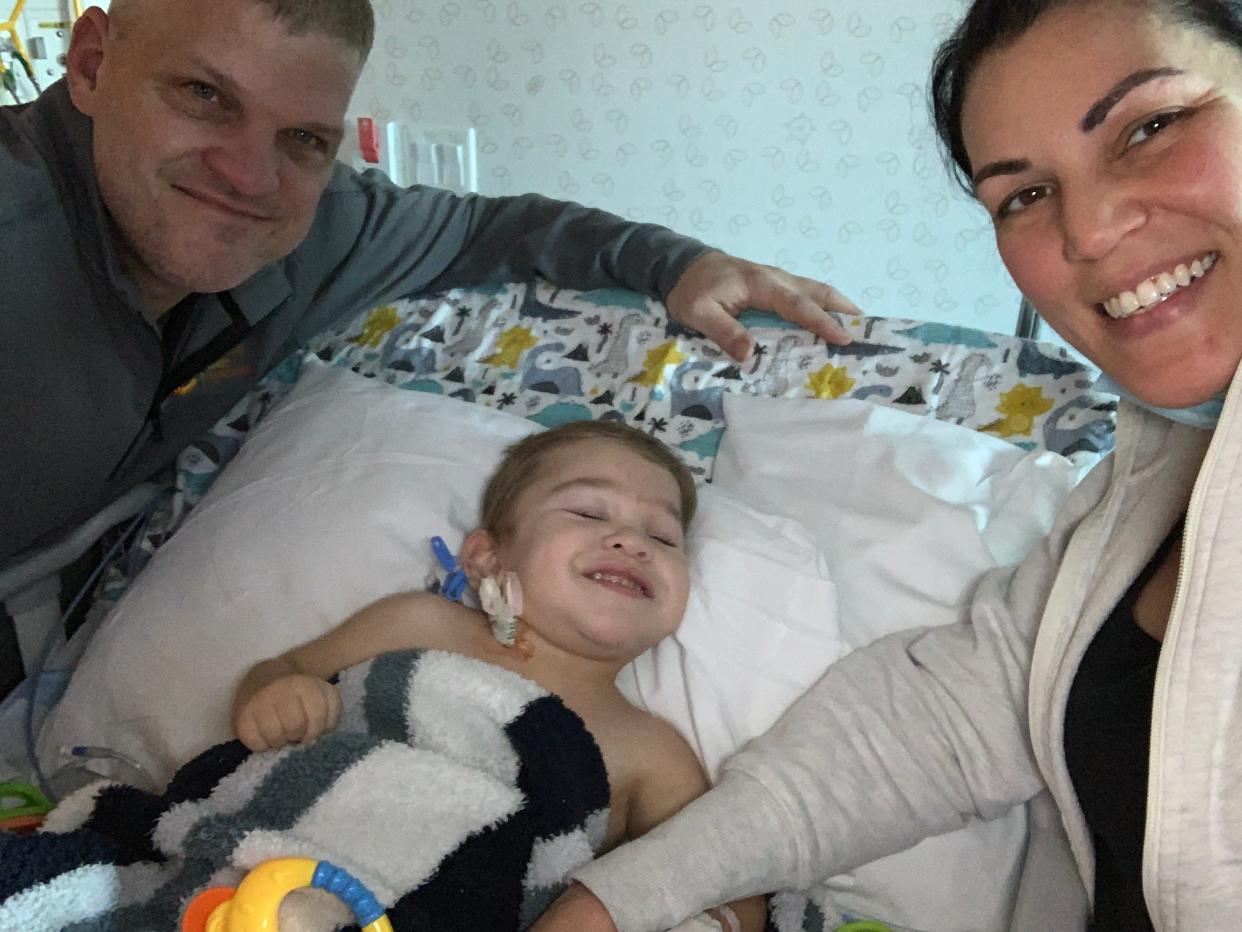
Less than 48 hours after receiving a new kidney in a transplant, Baby David Detwiler was awake, calling for his mom and charming his nurses.
Early Sunday morning, the Massillon toddler’s parents got a phone call to get to Cincinnati Children’s Hospital as soon as they could. A match for David had been found from a deceased donor.
By Sunday evening, the little boy who was born without a functioning kidney or bladder had a new kidney that was producing urine.
“He's making urine. I’ve never been so excited to see pee in my life,” mom Carlla Detwiler said by phone Wednesday morning from David’s room in Cincinnati Children's intensive care unit.
The first night was rough because David was in pain and crying and fussy, his mother said. But Tuesday, David was starting to show his personality after being sedated for most of Sunday and Monday.
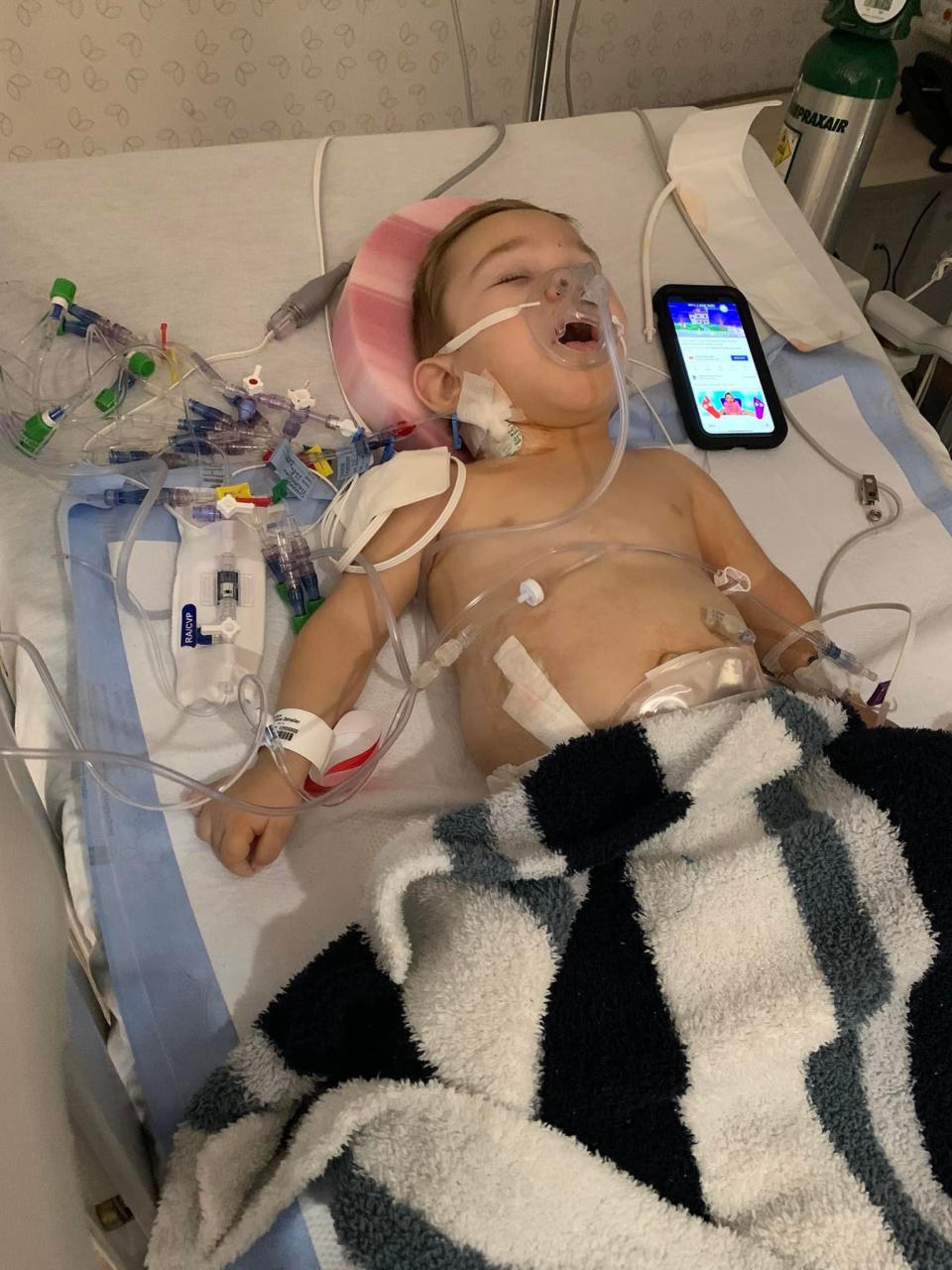
“He’s starting to act more like himself today, calling for me, my mom and playing with some toys,” Carlla said Tuesday via text. Health care workers also started getting him up for therapy, which he wasn’t a fan of, but he did it.
“He’s playing with his toys and is telling his nurses 'hi' and 'bye,' ” Carlla said. “It’s so crazy to think about what's transpired in the last 48 hours.”
On Wednesday, Carlla said David was telling his nurses “thank you” when they would leave the room.
Baby David was first featured in a two-day series in the Beacon Journal in October 2019. (To read the series, go to www.tinyurl.com/ABJBabyDavid.)
His parents, Brad and Carlla, discovered before his birth that their fourth child had no functioning kidney. They were told to terminate the pregnancy or carry the baby to term to potentially get a few minutes before he died because he would not have fully developed lungs to breathe.
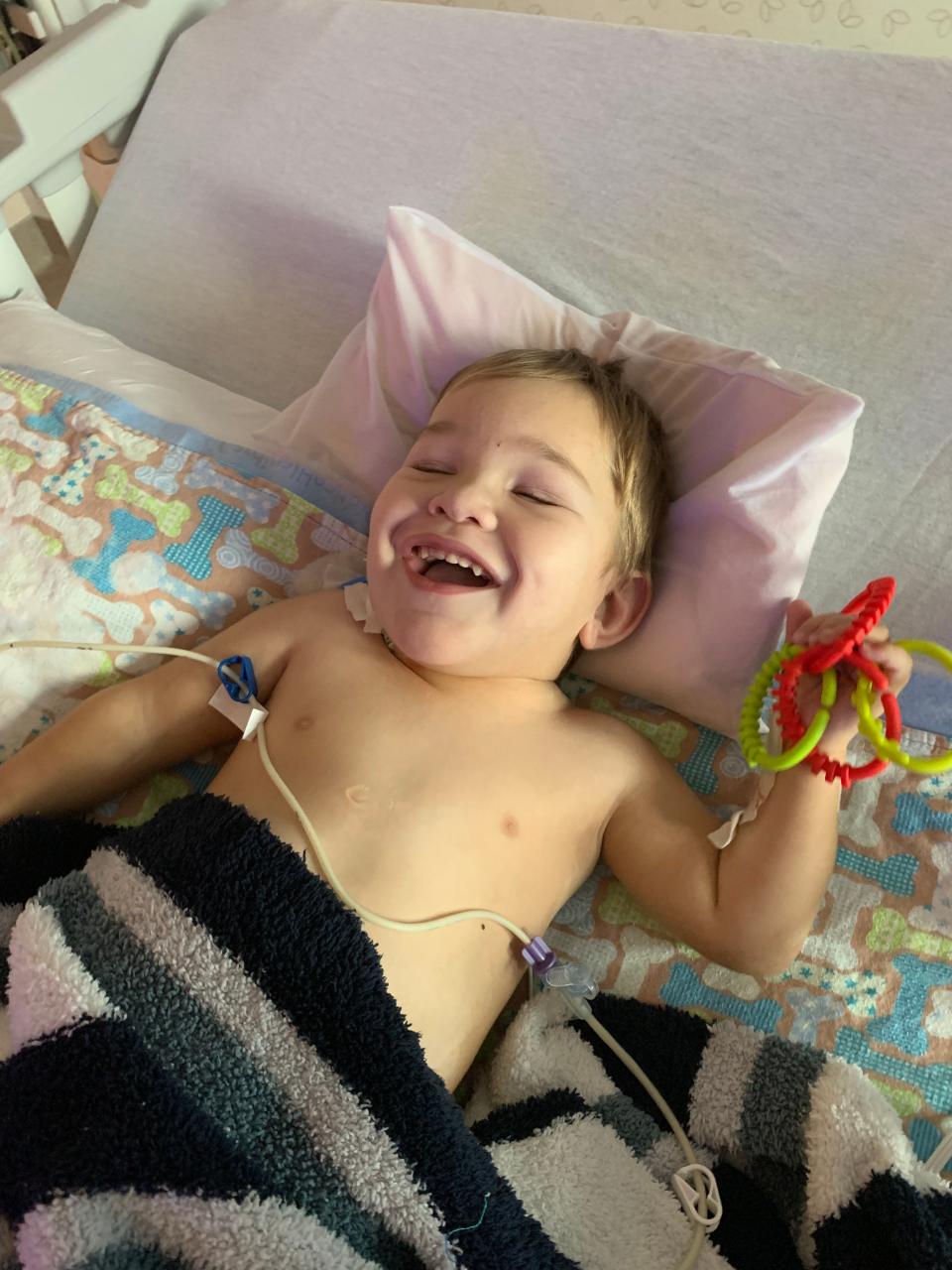
Instead, Carlla found doctors at the Cincinnati Children's Fetal Care Center, a collaboration of Cincinnati Children’s Hospital Medical Center, University of Cincinnati Medical Center and TriHealth, who agreed to treat her with a procedure called amnio infusion.
For 10 weeks, Carlla and Brad drove to Cincinnati from their Massillon home for her to get painful shots in her abdomen to create amniotic fluid to help get David to birth.
David survived birth and has undergone 12 hours of peritoneal dialysis at home each night, with the goal of a kidney transplant. His parents also later discovered David is blind in both eyes and has cerebral palsy.
This Thanksgiving, the Detwilers shared the exciting news that David was approved for transplant, but the family had been warned it may take time for a living donor or deceased donor to be found.
Exactly a week after the story ran in the Beacon Journal, a match was found.
Day 1, Oct. 2019 Baby David story: Parents' faith, science help Massillon boy beat odds
Day 2, Oct. 2019 Baby David story: Family adjusts to daily challenges for baby boy
Nov. 2020 Baby David update:: Baby David's giant battle: Family thankful for son who faces more hurdles
Nov. 2021 update: Baby David’s giant battle: Boy born without working kidney is one step closer to transplant
Dec. 6, 2021:: 'A Christmas miracle': Baby David gets a kidney transplant
Dec. 2022 update:Baby David's Giant Battle: 'They gave David the gift of life'
Ahead of schedule
David has done very well and is ahead of schedule, said Dr. David Hooper, the medical director of kidney transplantation at Cincinnati Children's Hospital.
The surgery was complex and was a success because of the dozens of physicians and health care workers who coordinated on behalf of David, Hooper said. That included Dr. Chuck Varnell, associate medical director of kidney transplantation, who took the initial kidney call and coordinated Sunday’s transplant; Dr. Greg Tiao, the surgeon who performed the surgery; Tricia Soulas, the pre-transplant coordinator; and many others, including the inpatient nephrology team led by Drs. Stefanie Benoit and Tori Besser and other members of the hospital team, said Hooper.
Brian Vanderbrink is the urologist who performed the critical portion of the procedure to attach David's ureter to his abdominal wall instead of his bladder in order to allow the urine to drain, said Hooper.
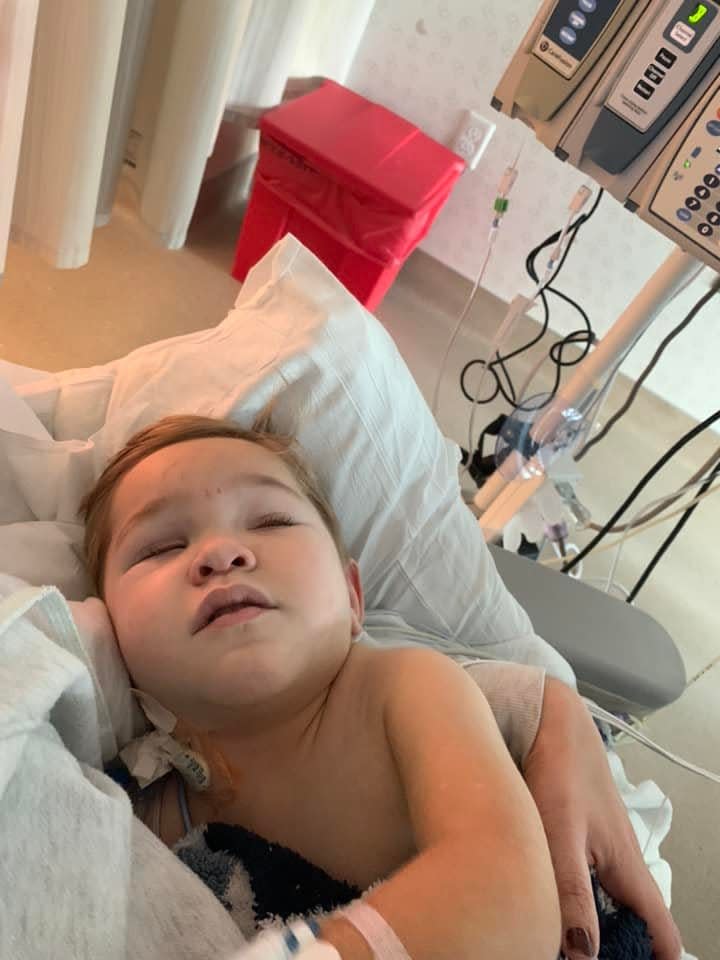
Hooper typically tells families to expect a rough first four days because the patients are uncomfortable and have been through a major surgery.
“Things are pretty complicated but by day four usually things settle out pretty nicely. David sort of settled out by day two to three and he's done very well,” Hooper said in a phone interview on Wednesday.
Hooper and other doctors have told the Detwilers that the first nine months after a transplant are very risky as the body is recuperating from a major surgery, trying not to reject the new organ and immunosuppressed from medications.
“I always try to be cautiously optimistic. So far ... David read the book and he's behaving himself,” Hooper said.
“We can take it for granted, but it's pretty miraculous what just happened,” Hooper said of the transplant.
David was doing so well on Wednesday that he was scheduled to leave the ICU early to a regular room, but the hospital is so full that there wasn’t a general room ready for him, Carlla said.
Carlla and Brad had been warned that babies retain a lot of liquid after transplant and there could be a large bulge where the kidney was placed because the kidney is usually from an adult deceased donor, but David’s donated kidney was smaller.
“His kidney worked so good right from the beginning ... that he did not retain fluid like most kids do,” said Carlla. “I am so thankful for whoever's kidney this is. It is like a perfect match.
“It's just it's perfect for him, and it has worked so good from the beginning," she said.
The quick match
David’s relatively quick match after being approved for a transplant in early October was because of a few reasons, Hooper said. David has accumulated time on the United Network of Organ Sharing (UNOS) registry, since three days after birth, when he started dialysis. UNOS is the governing body for all deceased donor kidneys in the U.S. and pediatric cases also get a higher priority.
But a change made in March also benefited David and other kidney transplants, Hooper said.
The potential pool of deceased donors to find a match used to be from within the Greater Cincinnati area for a kidney, which was more limiting, Hooper said.
In March, the region expanded to 250 miles from Cincinnati and pediatric cases also got bumped up in priority, which meant David’s potential kidney could have come from a region that includes Akron, Indianapolis, Columbus, Lexington and Louisville, Hooper said. (Correction: An earlier version of this story said Akron was not part of the region.)
Not much is known about the deceased donor, though the kidney itself goes through a thorough assessment before and after its arrival at the hospital, Hooper said.
Carlla said she was told that rules have changed regarding contacting the donor’s family and in a few weeks, her family will be able to send a message to the donor’s family through the transplant coordinator to see if the donor’s family is interested in corresponding or meeting.
Carlla said she has been thinking a lot about the donor’s family and the gift their loss has given her son.
“I want them to know how far he's come and what they've done for him,” she said.
For now, David continues his recovery and will likely stay at the hospital through sometime next week before being sent home. He will then do all of his follow-up care at his home hospital, Akron Children’s Hospital. Akron Children's does not do kidney transplants and has a long-standing partnership with Cincinnati Children’s.
Big changes for the family
Carlla and Brad said while David’s new kidney is a huge step for him, the biggest benefit will be for their three older children. For 2½ years, their family has been tethered to the house and specifically to Carlla and Brad’s bedroom, where they connect David to his dialysis machine at 7 p.m. every night for 12 hours.
Little did Carlla know, she said, that on Saturday night she set up David’s dialysis machine in her bedroom for the last time.
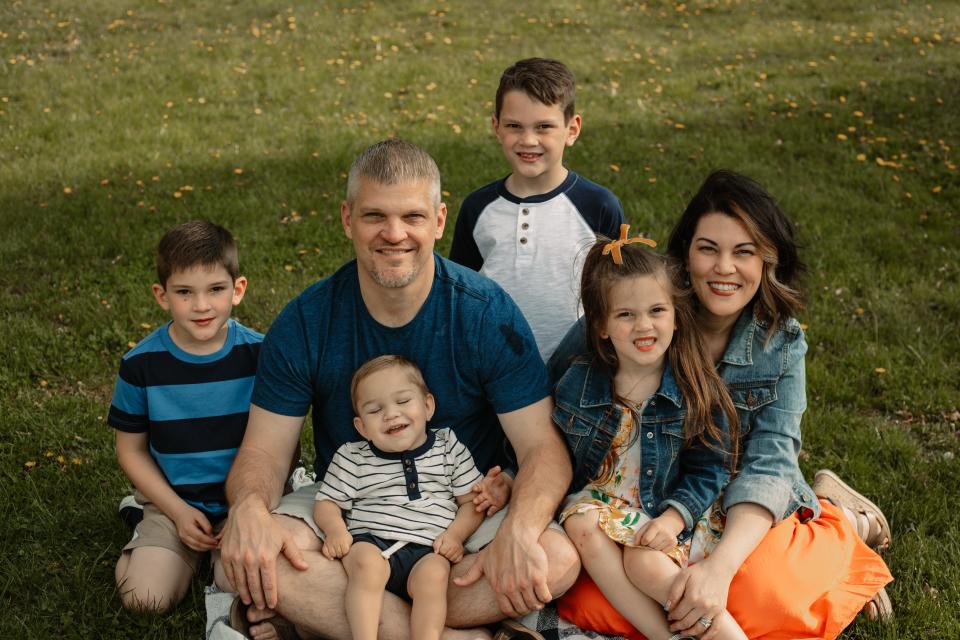
She now looks forward to eventually taking the kids on a real vacation or just having a normal life once David is out of the woods after his transplant.
“Just having our lives back in the evening and being able to like lay on the family room floor and play a game of Candyland with the kids and not be locked in our bedroom from 7 p.m. to 7 a.m.,” she said.
The dialysis has been harder as David has grown into a toddler and gets fussy being tethered to the machine, she said.
Brad is looking forward to family time with all of his children, “especially in the spring and summer when it's light outside at night."
"We can go outside and hang out and throw the ball around a little bit longer ... that’s the big difference," he said.
Said Hooper: “It’s the little things that all of us take for granted that a patient on dialysis can’t do, and it really does impact the family in a major way. It’s a blessing, undoubtedly.”
Beacon Journal staff reporter Betty Lin-Fisher can be reached at 330-996-3724 or blinfisher@thebeaconjournal.com. Follow her @blinfisherABJ on Twitter or www.facebook.com/BettyLinFisherABJ. To see her most recent stories and columns, go to www.tinyurl.com/bettylinfisher
This article originally appeared on Akron Beacon Journal: David Detwiler of Massillon doing 'phenomenal' after kidney transplant

